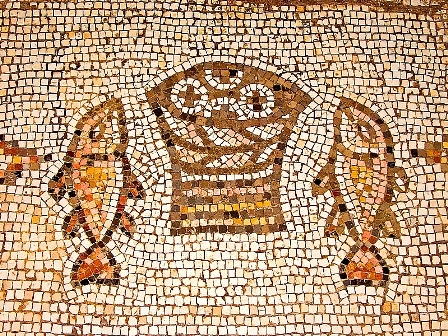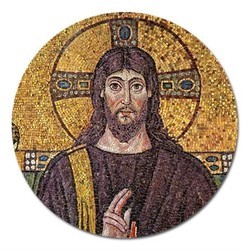The views expressed in our content reflect individual perspectives and do not represent the authoritative views of the Baha'i Faith.
 [Editor’s Note: This is the second installment of a multi-part essay called “Questions from a Clergyman”. Click here to read from the beginning.]
[Editor’s Note: This is the second installment of a multi-part essay called “Questions from a Clergyman”. Click here to read from the beginning.]
Here’s the context for this article and this series — a “Cult Night” at one local Christian church where an evangelical pastor (aka “Daniel”) presented his view of the Baha’i Faith, and gave the Baha’i’s present an opportunity to clarify the issues he raised. I was the chosen speaker for the “cult” because I had come into the Baha’i Faith from a Christian background — and many of the questions Daniel asked I had asked as well.
Pastor Daniel’s first question: “The Bible tells us Christ — and therefore God — is the same yesterday, today, and tomorrow. Doesn’t the concept of progressive revelation mean God changes?”
A Christian professes that Christ is the author, object, and completion of her faith. A Baha’i also professes this — because, to a Baha’i, there is no point at which Christ ends and Baha’u’llah begins. Though Jesus of Nazareth and Baha’u’llah were different physical Lamps, the Light that shone in and through Them is the same Light.
How am I so sure? I have the testimony of Christ and the prophets, and the spiritual fruits of the life and teachings of Baha’u’llah as assurance.
 So, no, God does not change. But we do. God reaches out to us through His Word, knowing we have the capacity to change. Faith implies transformation and rebirth, after all.
So, no, God does not change. But we do. God reaches out to us through His Word, knowing we have the capacity to change. Faith implies transformation and rebirth, after all.
As a mother, I sometimes joke about freezing my children at a particular age, but I know that’s neither possible nor desirable. They must grow to adulthood, find their own beliefs and develop the maturity to become complete human beings. They must change. As they change, I must change the way I relate to them and teach them. I must speak to them more clearly, explain things more directly, and let them search for the meaning in their own lives.
Likewise, in our relationship with God both as individuals and as a species, God alters the way He speaks to humanity. We can see this in scripture. Moses spoke of the appearance of another Prophet like Him who would be raised up among the Jewish people, the one the Torah refers to as “The Prince, the Messiah.” His name is not Moses, His station is different. But He is a Prophet like Moses nonetheless — a Prophet who sees God face to Face. Christ confirms that this refers to Him in John 5:46 when He says: “For had ye believed Moses, ye would have believed me; for he wrote of me.”
When Christ appeared, He changed Mosaic laws, which outraged the Jews. Christ says of Moses’ law of divorce:
Moses, because of the hardness of your hearts, permitted you to divorce your wives, but from the beginning it was not so. – Matthew 19:8.
He then proceeds to give a new teaching. Baha’is understand this as progressive revelation – God’s continuing education of humanity.
Did God’s feelings about marriage change? No, but our hearts (and our capacity) did.
 Jesus claims He is authorized to teach what Moses could not, then tells His disciples there is much He cannot reveal because it goes beyond even their capacity to understand. In John 16:12 Christ says:
Jesus claims He is authorized to teach what Moses could not, then tells His disciples there is much He cannot reveal because it goes beyond even their capacity to understand. In John 16:12 Christ says:
I still have many things to say to you, but you cannot bear them now. However, when He, the Spirit of truth, has come, He will guide you into all truth…
He also speaks of going away so that God will send “another Counselor,” reminding us of Moses’ statement that God will send “another Prophet.” The book of Hebrews supports this reading:
God, who at various times and in various ways spoke in time past to the fathers by the prophets, has in these last days spoken to us by His Son… – Hebrews 1:1.
Baha’u’llah, the Founder of the Baha’i Faith, speaks to this directly:
Jesus, Himself, declared: ‘I go away and come again unto you.’ Consider the sun. Were it to say now, ‘I am the sun of yesterday,’ it would speak the truth. …In like manner, if it be said that all the days are but one and the same, it is correct and true. And if it be said, with respect to their particular names and designations, that they differ, that again is true. …Conceive accordingly the distinction, variation, and unity characteristic of the various Manifestations of holiness … and discover the answer to thy question as to why that everlasting Beauty should have, at sundry times, called Himself by different names and titles… – Gleanings XIII.
Given the pattern God revealed in the Old and New Testaments alone, the prophecy in the Revelation of Saint John that speaks of Christ having “a New Name” should come as no surprise. As a Baha’i, I believe that Christ has returned, in this “renewal of all things,” seated upon His “glorious throne,” with the New Name of Baha’u’llah — the Glory of God.
He has a new name – Baha’u’llah — and a new physical vessel, but that Vessel doesn’t contend or compete with Jesus of Nazareth – just as Jesus didn’t compete with Moses.
Read the next article in the series: End of the World?
Read the previous article in the series: Cult Night and the Baha’i Faith
You May Also Like
Comments

















Are you familiar with the philosopher Alfred North Whitehead from Harvard University? In his famous book Process and Reality, An Essay in Cosmology, 1929, he makes a distinction between God's primordial Nature and God's consequent Nature. In an essay I wrote about process-philosophy and the Bahá'í Faith I tried to demonstrate that God's consequent Nature is the same as the Will of God. ...In the Manifestation of God we see the expression of the Will of God or the Logos. You made it perfectly clear when you gave the example of educating children and our changing attitude during the process of growth. Aldous Huxley writes in his book The Perennial Philosophy that 'knowledge is a function of being'.
Hans Dirk Nagtegaal This is a difficult question. There are two perspectives on God from the process philosophy of Whitehead: God's consequent Nature and God's primordial Nature. The consequent Nature of God changes with each New Revelation. You can say God suffers when humanity suffers. The primordial Nature of God is absolute, unchangeable. This philosophical view has some similarity in the Baha'í view on God's Nature. In april 2013 I made a presentation on this subject in The Dierense Toren (Dieren is a place in the province of Gelderland in Holland).
Reggie
Now concerning your second question. You are right that a Manifestation of God has a twofold nature, but certainly many things more can be said about a Manifestation of God. In Gleanings of the Writings of Bahá'u'lláh chapters XX, XXII, XXIII en XC and in 'Abdu'l-Bahá's Some Answered Questions part III, chapters 36 to 40 many aspects of the Manifestations are explained. It is to much to go into details here. Therefore I limit myself to just a few comments. In chapter 16 of SAQ 'Abdu'l-Bahá makes clear that the Holy Writings use outward forms and symbols to convey intellectual conceptions. It is important to realise that these forms and symbols are part of - what we call in modern theology and in the philosophy of religion - an imagery-language or a metaphor-language. 'Abdu'l-Bahá gives three examples: "Then it is evident that the dove which descended upon Christ was not a material dove, but it was a spiritual state, which, that it might be comprehensible, was expressed by a sensible figure. Thus in the Old Testament it is said that God appeared as a pillar of fire: this does not signify the material form; it is an intellectual reality which is expressed by a sensible image." Then 'Abdu'l-Bahá "comes to the explanation of the words of Bahá u lláh when He says: O king! I was but a man like others, asleep upon My couch, when lo, the breezes of the All-Glorious were wafted over Me, and taught Me the knowledge of all that hath been. This thing is not from Me, but from One Who is Almighty and All-Knowing. This is the state of manifestation: it is not sensible; it is an intellectual reality, exempt and freed from time, from past, present and future; it is an explanation, a simile, metaphor and is not to be accepted literally; it is not a state that can be comprehended by man."